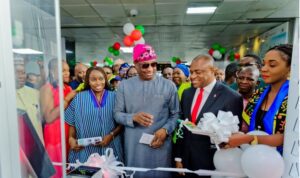Naira depreciates by 0.17% at official market
By David Awoyemi
Naira depreciated by 0.17 per cent yesterday at the official Investors and Exporters (I & E) Window as the Central Bank of Nigeria (CBN) struggles to sustain its float-management stance.
Trading report obtained indicated that naira depreciated to N463.67 per dollar as against its previous close of N462.88 per dollar.
Most participants at the official foreign exchange (forex) window maintained bids between N460.00 and 466.00 per dollar.
The depreciation in naira at the forex market comes as the apex bank seeks to sustain its controlled rate at the official window, despite some 300 basis points gap between the official rate and the parallel market rate.
Most non-government, private independent users source forex from the parallel market, which is being funded by private sources seeking higher margins and round-tripping of funds from the official window.
Nigeria’s foreign exchange (forex) reserves had hit a new low at $35.39 billion last weekend amidst dwindling inflows and apprehensions over the country’s forex management framework.
The nation’s external reserves had dropped by $111.10 million to $35.39 billion at the weekend, its 11th consecutive weeks of decline.
Nigeria’s forex reserves had lost more than $1.82 billion in nearly three months of a free fall. Official forex reserves status data report obtained from the CBN indicated that forex reserves had depleted from $37.211 billion by January 16, 2023 to $35.39 billion at the weekend.
Nigeria’s external reserves, which closed 2022 at about $37.08 billion, had picked at $37.211 billion on January 16, 2023. It has since been on the decline, dropping to lower level every week over the past 10 weeks.
Most analysts agreed that Nigeria’s shaky forex reserves position and currency crisis were directly due to the CBN’s currency management stance. The apex bank’s fixed-rate, controlled exchange policy has seen the emergence of parallel markets with some 290 basis points between the official rate and the market-driven, unofficial parallel market.
Analysts have also called for major forex and macroeconomic reforms to stem decline and encourage direct and indirect forex inflows into the country.
Analysts at Cordros Capital said they believe the forex crisis “will remain over the short-to-medium term” as there is no positive signal that denotes an improvement in forex supply relative to the pre-COVID-19 levels.
“Moreover, considering the tepid accretion to the reserves given low crude oil production and elevated premium motor spirit (PMS) under-recovery costs, foreign portfolio investors (FPIs) who have historically supported supply levels in the Investors & Exporters Window will be needed to sustain forex liquidity levels in the medium to long-term,” Cordros Capital stated at the weekend.
Analysts at Cordros Capital attributed the persistent slowdown in capital importation to foreign investors’ lacklustre interest in the country “given an unclear foreign exchange framework, an uninspiring macro narrative, elevated global interest rates, and heightened global uncertainties.
“While we believe a new government will be a breather for the country in the short term as sentiments are likely to improve, we think foreign capital inflows will remain low compared to pre-COVID levels over the medium term in the absence of significant reforms in the forex, fiscal and monetary policy frameworks,” Cordros Capital stated.
Further Analysts at Afrinvest (West Africa) said Nigeria’s capital importation continues to weaken below its pre-Covid level of $24 billion, “primarily due to the investors’ aversion to subsisting forex policies.”
“Specifically, the prominence of capital controls to manage the ongoing forex crisis complicates fund repatriation from Nigeria and, by the same token, discourages new investments by offshore players,” Afrinvest stated.




